Agriculture & Environment
Mak-CAES Holds 2nd International GORILLA Conference
Published
3 years agoon
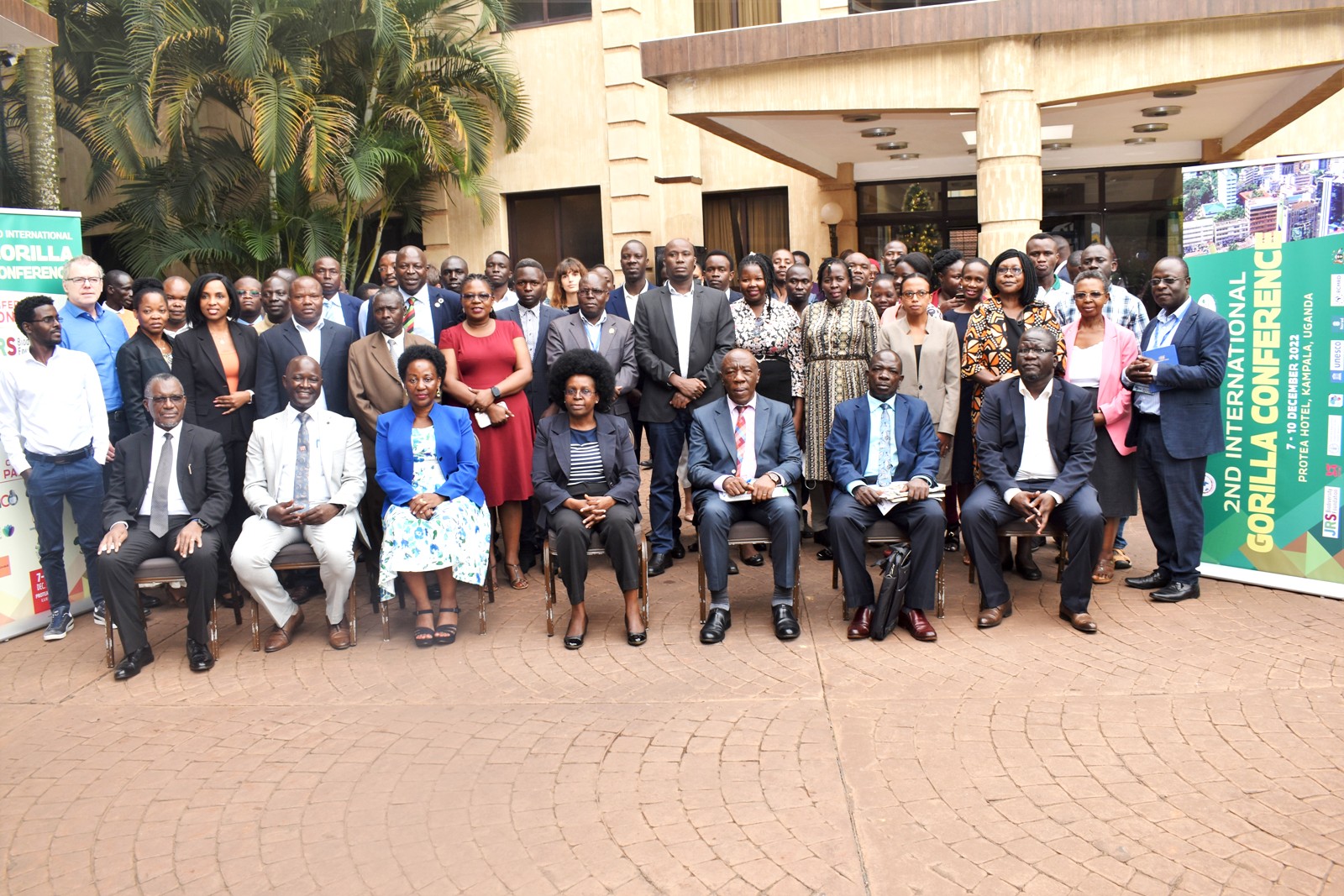
The International Conference on Geographical Science for Resilient Communities, Ecosystems and Livelihoods Under Global Environmental Change (GORILLA) seeks to contribute to the realization of the Global Development Agenda 2030 and the AU Agenda 2063.
Overview
The resilience of ecological and social systems has gained heightened attention globally and are at the center of the United Nations Global Development Agenda 2030 manifesting in; (a) the 17 Sustainable Development Goals and 169 targets, (b) the Sendai Framework for Disaster Risk Reduction, 2015-2030 with its four priorities and 7 targets, (c) the Paris Agreement geared at keeping temperature within the 1.5 º-2 ºC threshold.
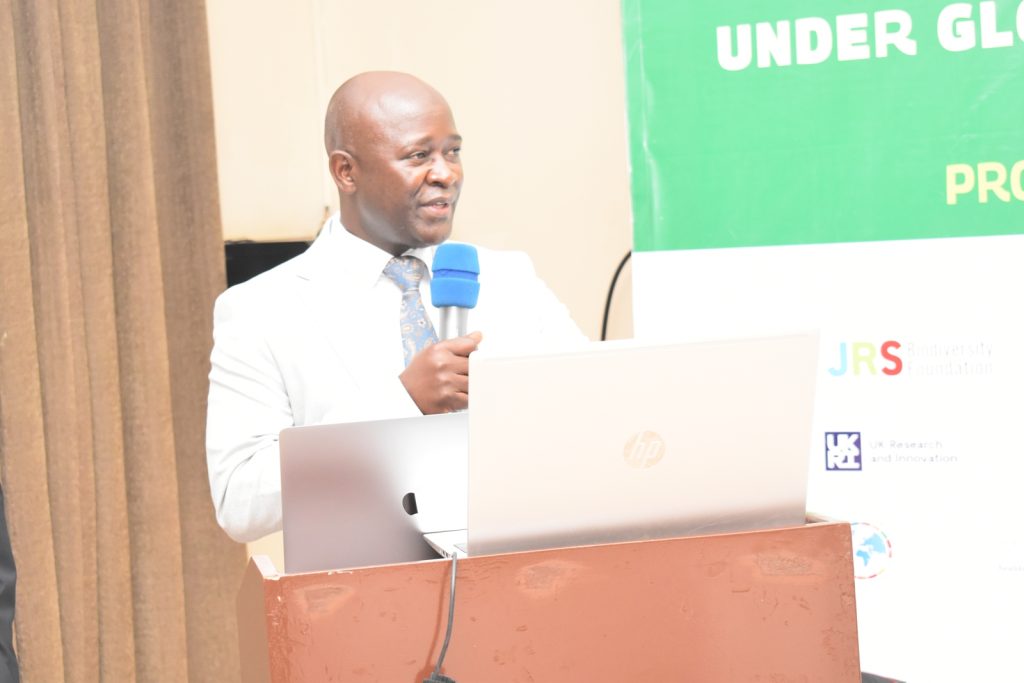
Substantial efforts by the global community have been variously invested in resilience building and sustainable systems in light of multiple exposures and threats. But huge gaps and challenges still remain that compromise realizing the desired goals. The effects of the global financial crisis, existing geo-political tensions and the emergence of COVID19 altered the resilience trajectory with new dimensions in health, natural resources and poverty. Moreover, recent events exemplified by record temperatures registered in several countries but most notably in the UK, the increasing frequency and magnitude of hydrometeorological hazards as witnessed in Uganda, the increasing loss of biodiversity (>1,000,000 species lost) as recently reported by Intergovernmental Science-Policy Platform on Biodiversity and Ecosystem Services (IPBES) have heightened the need for urgent interventions that protect vulnerable societies. A consequence of these processes coupled with other factors including but not limited to land use and land cover conversions, rapid urbanization, is that mixed progress has been registered in realizing the sustainability targets for 2030 (https://sdg-tracker.org) with Sub Saharan Africa (SSA) countries posting dismal progress. Uganda currently ranks 136/163 in SDG performance with an SDG Index Score of 53.5 (https://dashboards.sdgindex.org/profiles/uganda). Contextual knowledge creation and utility coupled with harnessing evolving and emerging technology are critical ingredients in building sustainable and resilience pathways and systems which the Global Sustainability Agenda aspired to achieve.
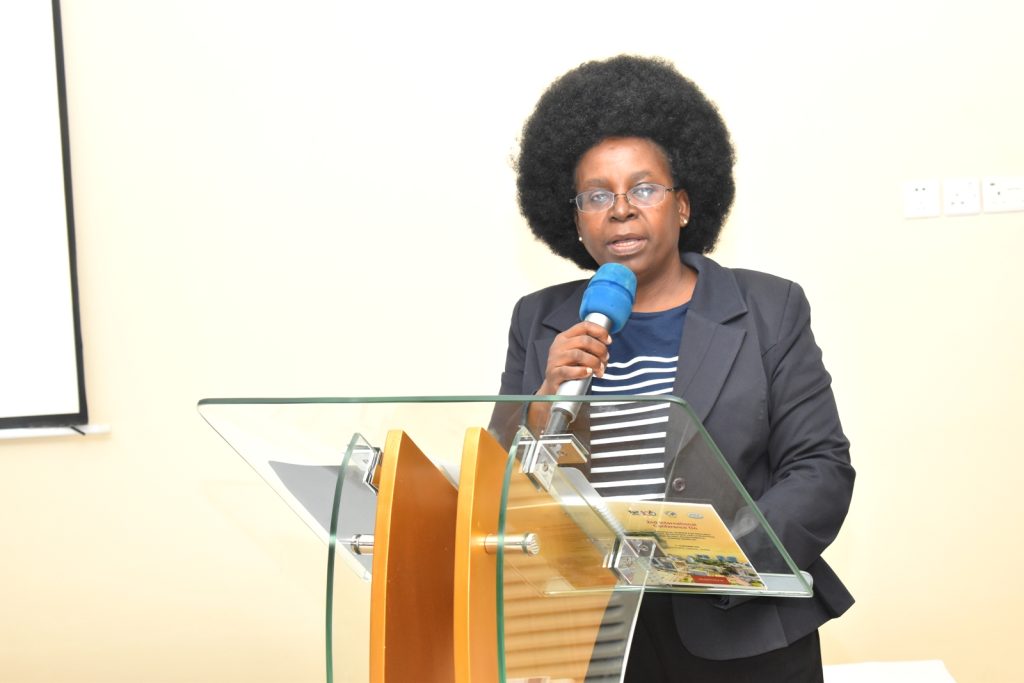
The 2nd GORILLA Conference
The 2ndGORILLA Conference organized by the College of Agricultural and Environmental Sciences (CAES), Makerere University, and the National Environment Management Authority (NEMA) sought to make a contribution to the realization of the Global Development Agenda 2030 and the AU Agenda 2063 by addressing two fundamental questions; (1) “how science, research and the academia can contribute to the expedited achievement of global targets and resolve societal challenges? (2) how local, regional and international partnerships as well as interactions between science, policy and practice can enhance the delivery and achievement of the global development targets?
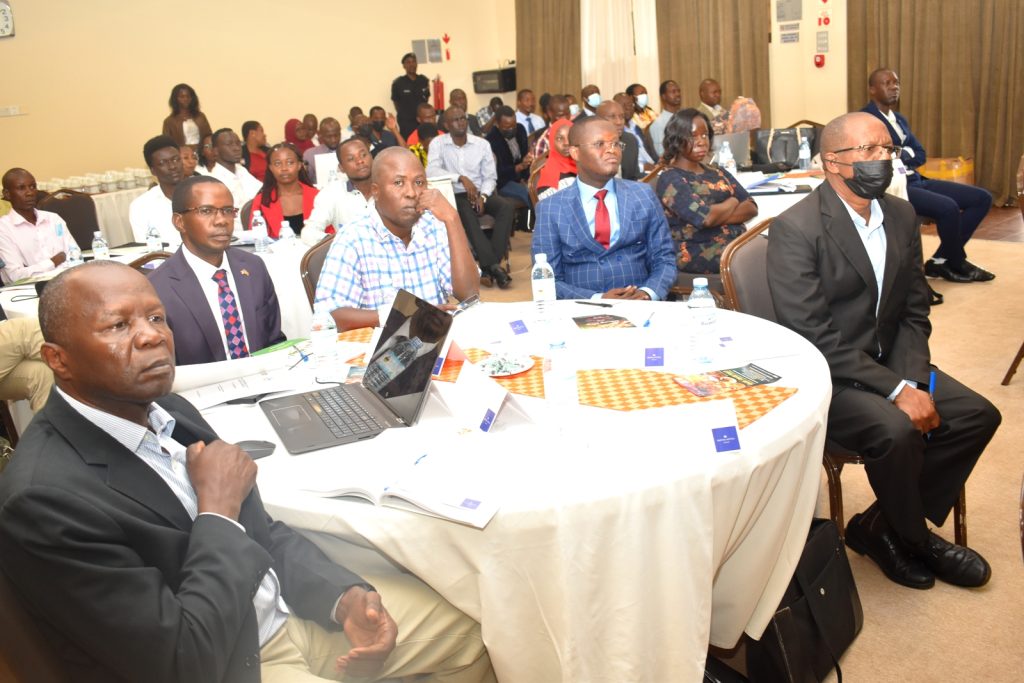
The conference held on 8th-9th December 2022 at Protea Hotel in Kampala was coordinated by Prof. Yazidhi Bamutaze, Associate Professor in the Department of Geography, Geoinformatics and Climatic Sciences, also Deputy Principal, CAES (Chair), and Dr Jerome S. Lugumira, Natural Resources Manager (Soil and Land Use), NEMA (Co-Chair). Sponsored by UNESCO, Biodiversity Foundation, the Food and Agriculture Organization of the United Nations, NORAD, UK Research and Innovation, BRAC Uganda, ARUA Water Centre of Excellence (CoE), and the Regional Centre for Mapping Resources for Development (RCMRD), the conference was attended by eminent scholars, researchers, representatives from the government and civil society organizations, and policy makers.It was presided over by the Minister of Science, Technology and Innovation, Hon. Dr. Monica Musenero Masanza, and graced by the Vice Chancellor of Makerere University represented by the Deputy Vice Chancellor in charge of Finance and Administration, Prof. Henry Alinaitwe; the representative of the Executive Director, NEMA, Dr Daniel Babikwa; the Principal of CAES, Prof. Gorettie Nabanoga; and the Dean, School of Forestry, Environmental and Geographical Sciences, Prof. Fred Babweteera.
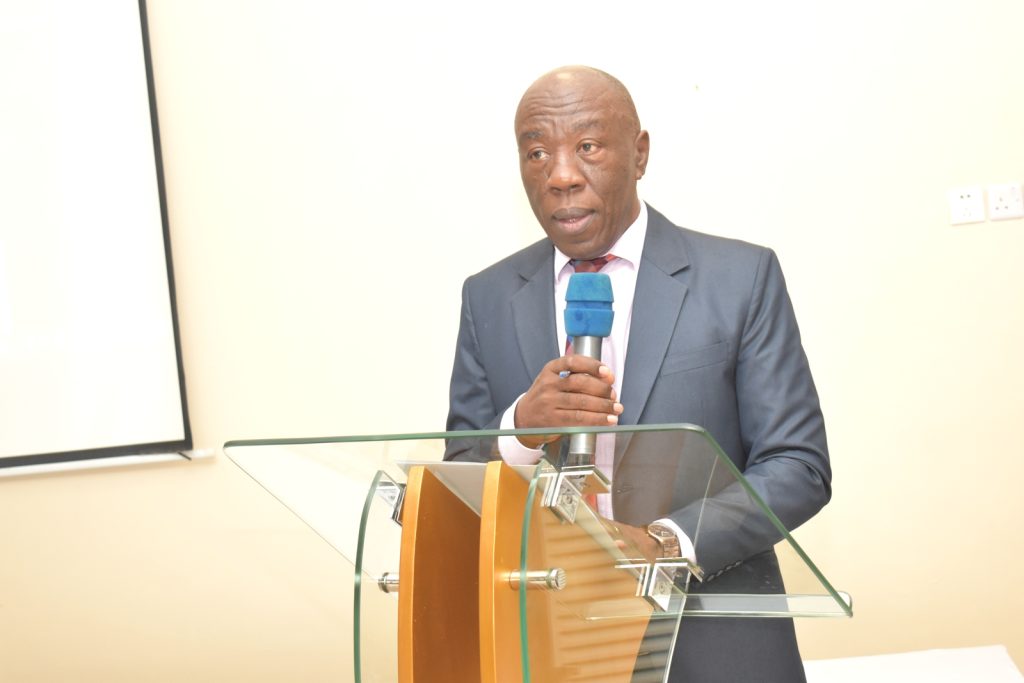
The conference featured a number of keynote speeches and presentations in relation to nature-based systems in mitigating Hydro-Meteorological hazards and disasters; climate smart agriculture for sustainable resilience; land degradation; migration and displacement; water management; biogeography, biodiversity and ecosystem conservation; and the future of smart cities and urban systems in Sub-Saharan Africa.
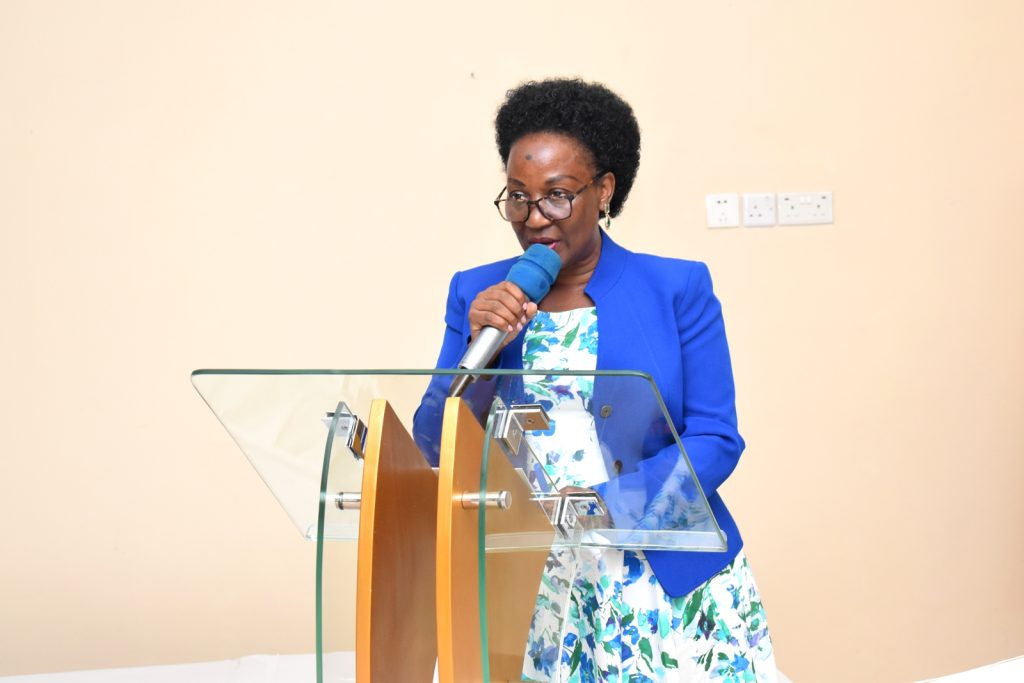
Keynote addresses
Prof. Tonny J. Oyana, Principal College of Computing and Information Sciences (CoCIS), Makerere University, also GIS and Spatial Analysis expert shared insights on optimizing biodiversity data science for societal benefits in developing countries. Dr Joy Obando, an Associate Professor in the Department of Geography at Kenyatta University delivered a presentation on building climate resilient communities and ecosystems in Sub Saharan Africa, whereas Dr Justine Namaalwa, an Associate Professor and Head, Department of Environmental Management at Makerere University addressed participants on the significance of optimizing green assets as a pathway to achieving the global development agenda. In her remarks, Prof. Namaalwa emphasized the need to preserve nature.
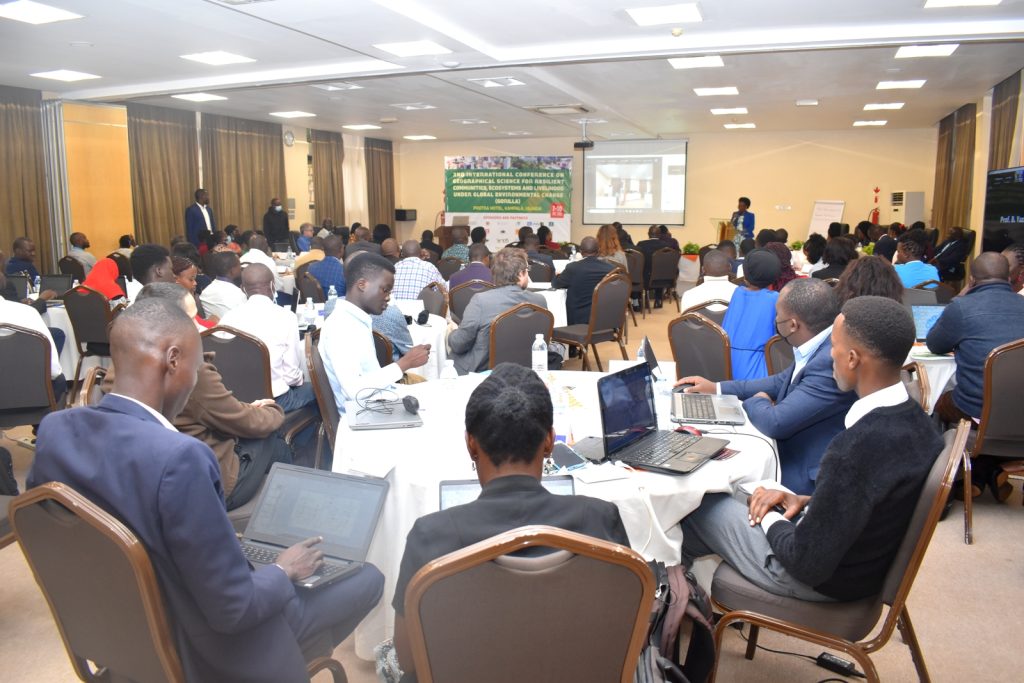
“Compromise nature then you fall on the targets of the Global Development Agenda.There is need to take stock of our natural assets and reflect on their value. If we are to continue with the mantra of no one should be left behind, there should be national ownership over the development process. We also need to adopt informal and formal knowledge systems,and embrace citizen science as well as global partnerships,” she explained.
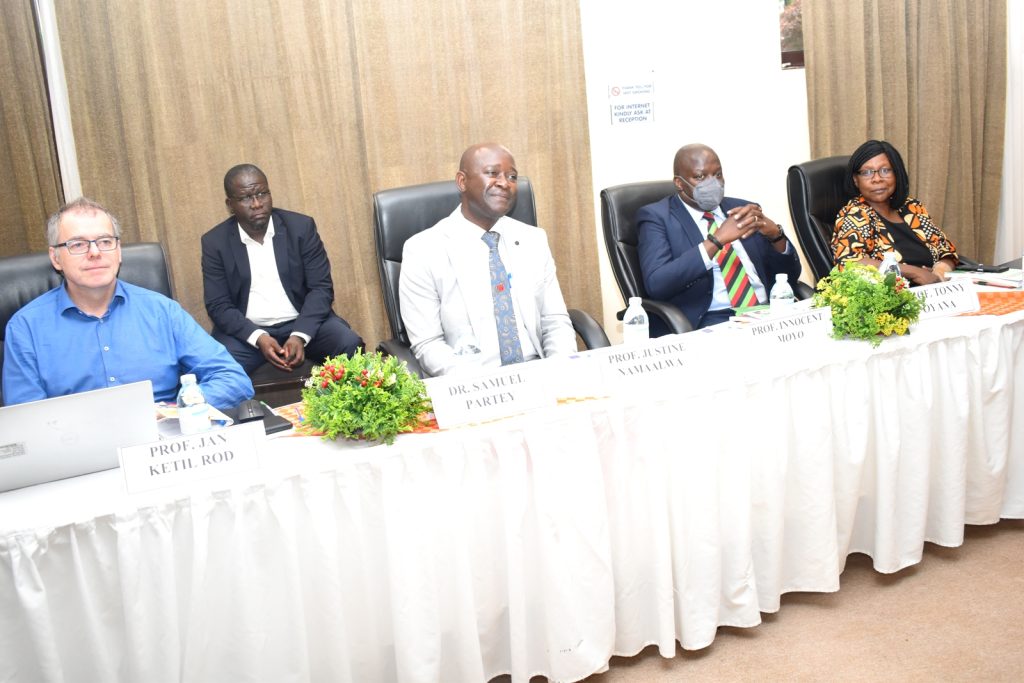
Prof. Jan Ketil from the Department of Geography, Norwegian University of Science and Technology (NTNU) briefed participants on the geography of disaster risk and participatory risk management, sharing insights on harnessing sensors and geospatial technology for disaster risk management. Dr Samuel Partey from UNESCO Regional Office in Nairobi, Kenya highlighted the significance of biosphere reserves in building resilient ecosystems and societies. Dr Partey is the youth focal person for science, and the evaluation focal point for UNESCO’S Oversight Unit at the Office in Nairobi.
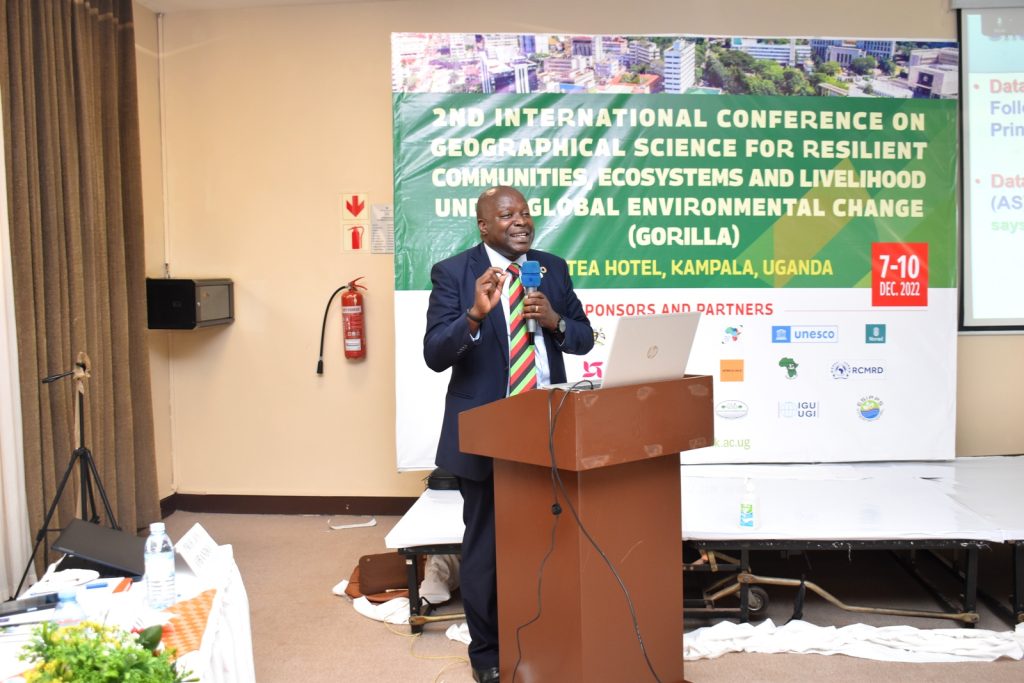
In his presentation, Prof. Heiko Baltzer from the University of Leicester, UK called for improved satellite earth observation as a measure to strengthen forest governance and livelihood resilience in Africa.
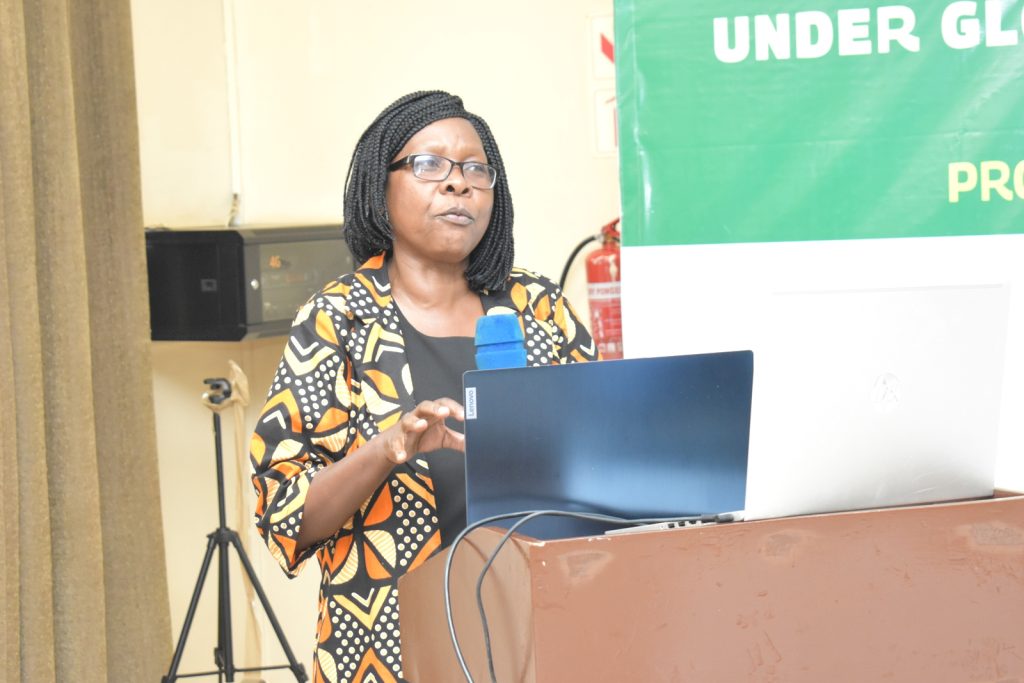
Panel discussion
The conference also featured a panel discussion on a number of topical issues in regard to Sustainable Development Goals (SDG); research and policy formulation; building resilient communities;prioritization of resilience in government planning and budgeting;factors undermining innovativeness; and the use of geoinformation in the quest to achieve sustainable development. Discussants included Hon. Dr. Magolo John Faith, Member of Parliament Bungokho County North and member of the Parliamentary Committee on Climate Change; Mr. Othieno Odoi, Senior Planner, Trade and Tourism at the National Planning Authority; Ms. Celia Nalwadda, Senior Research Officer, Uganda National Academy of Sciences (UNAS); Ms. Hellen Aketch, Project Manager BRAC Uganda; and Dr Anastasia Wahome, Lead, Science/Data at the Regional Centre for Mapping Resources for Development, Nairobi.
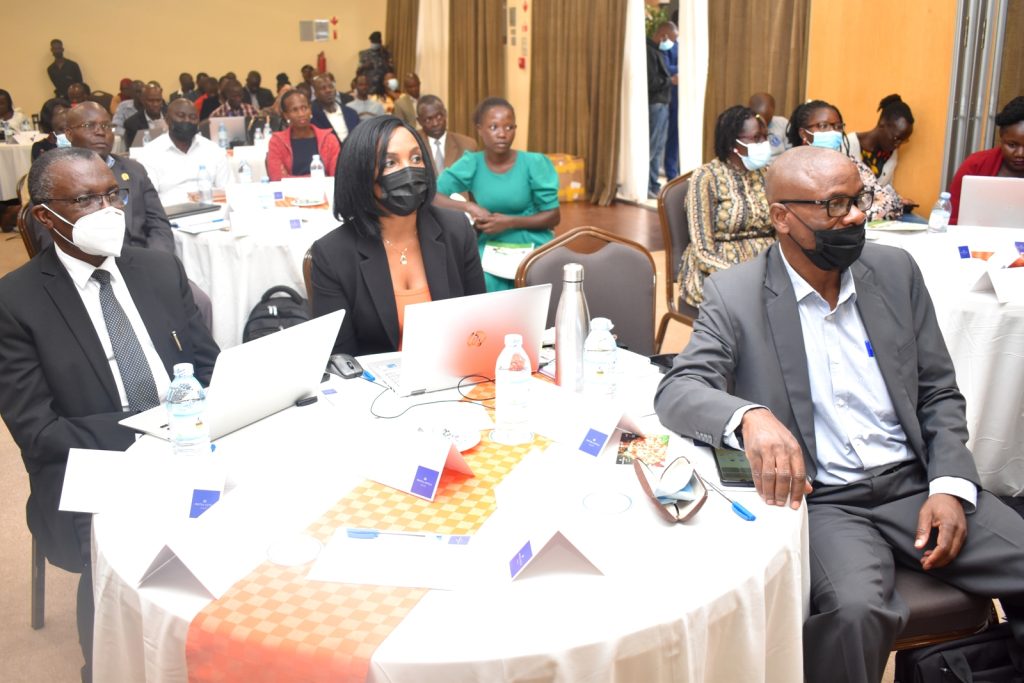
In his submission,Hon. Magolo informed participants that Parliament had passed the National Environment Act, 2019and the National Climate Change Act, 2021 to fast track the implementation of SDG 13 (Climate Action). Brac Project Manager, Ms. Hellen Aketch called for strengthened partnerships between universities and industry for increased uptake of research and sustainability of innovations. Ms. Anastasia Wahome emphasized the importance of geoinformation in disaster planning and management, whereas Dr Othieno Odoi from National Planning Authority noted that checks had been put in place to ensure issues regarding resilience, climate change, gender, and environment are catered for before government plans and budgets are passed. The discussion was moderated by Dr Patrick Byakagaba, a Lecturer in the Department of Environmental Management, CAES, Makerere University.
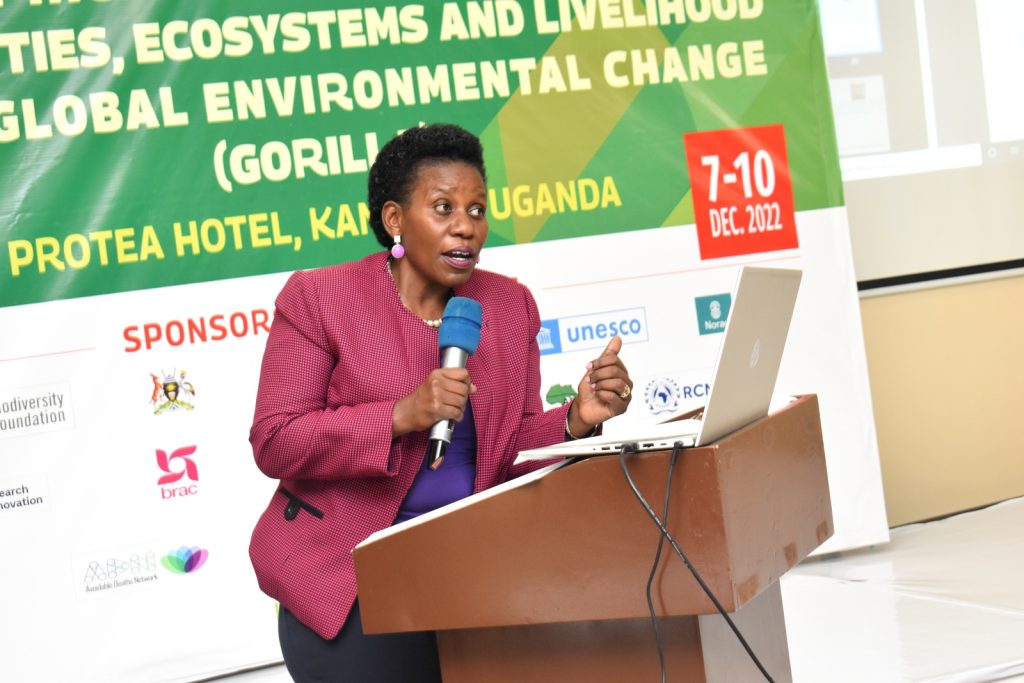
Remarks by the Minister – Hon. Dr. Monica Musenero Masanza
In her remarks, the Minister of Science, Technology and Innovation, Hon. Dr. Monica Musenero Masanza urged Africans to embrace technology development as a measure to foster socio-economic transformation on the Continent. “Science contributes 50% to our national development. However, we haven’t done much to embrace technology development. We are blindly technology consumers, mainly relying on imports which makes it hard for us to achieve sustainable development. Africans should stop delegating thinking and work towards developing their own technology. We need to stop thinking of ourselves as consumers of technology and work on educating a thinking generation that can develop our own technology. Universities have done well but I encourage them to change their mindset and focus more on developing technology. We cannot afford as a country, in this new dispensation of green energy economies, post COVID19, and the future as envisioned in Vision 2040, to remain dependent on imported technology. We need to be more innovative,” she advised.
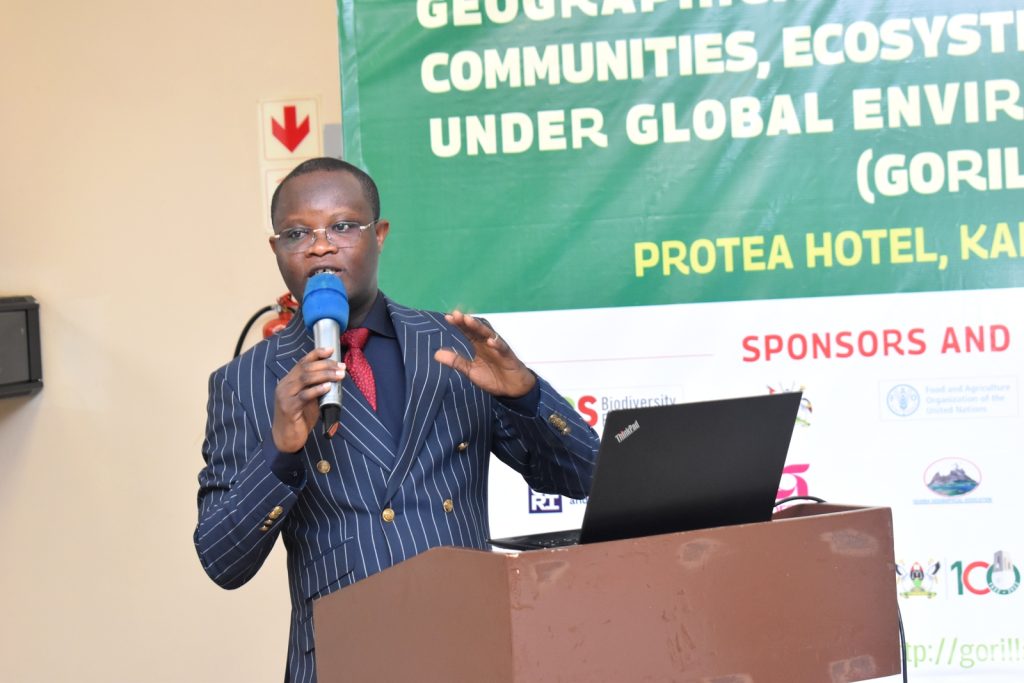
In line with the conference, the Minister emphasized the importance of geospatial tools in conserving ecosystems. Highlighting the significance of geography in developing the mobility industry, the Minister called for development of newer construction technologies. “The continued use of soil and stones in construction will lead to deformation of the ecology,” she noted.
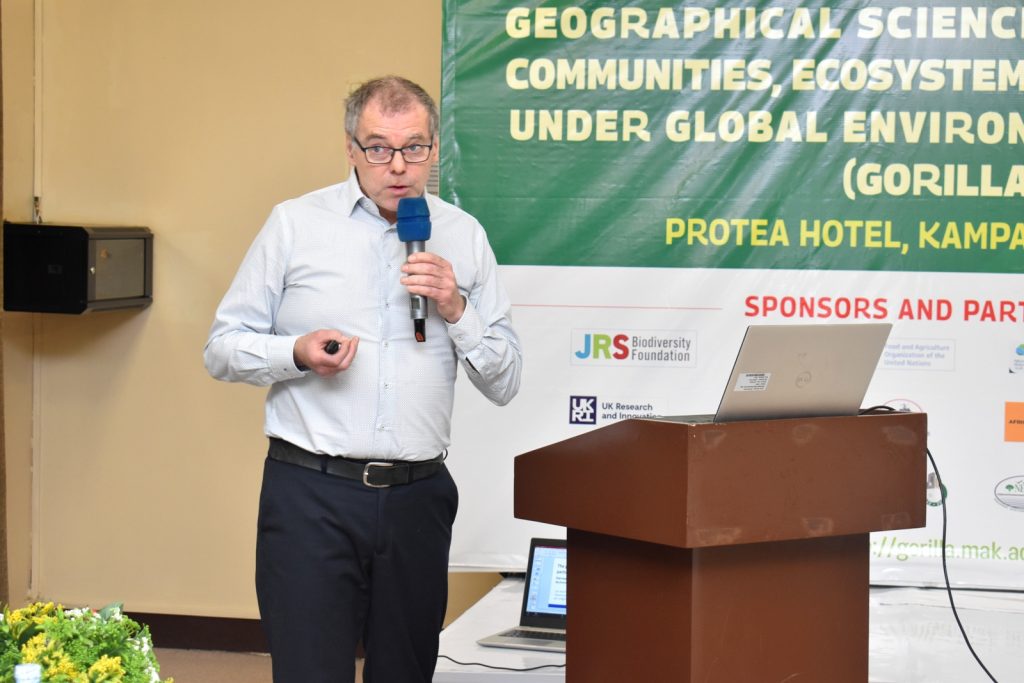
Addressing participants, the Deputy Vice Chancellor in charge of Finance and Administration, Prof. Henry Alinaitwe decried the continued depletion of ecosystems.“Climate change resulting from the continued destruction of ecosystems has led to erratic weather conditions with severe consequences for humanity. Because of erratic weather conditions, we cannot have good produces in terms of food and we are likely to have long spells of hunger. Achieving resilient and sustainable livelihoods requires continued research and invention of technologies to address challenges of climate change. It is gratifying that this conference seeks to address many of these challenges,” he noted.
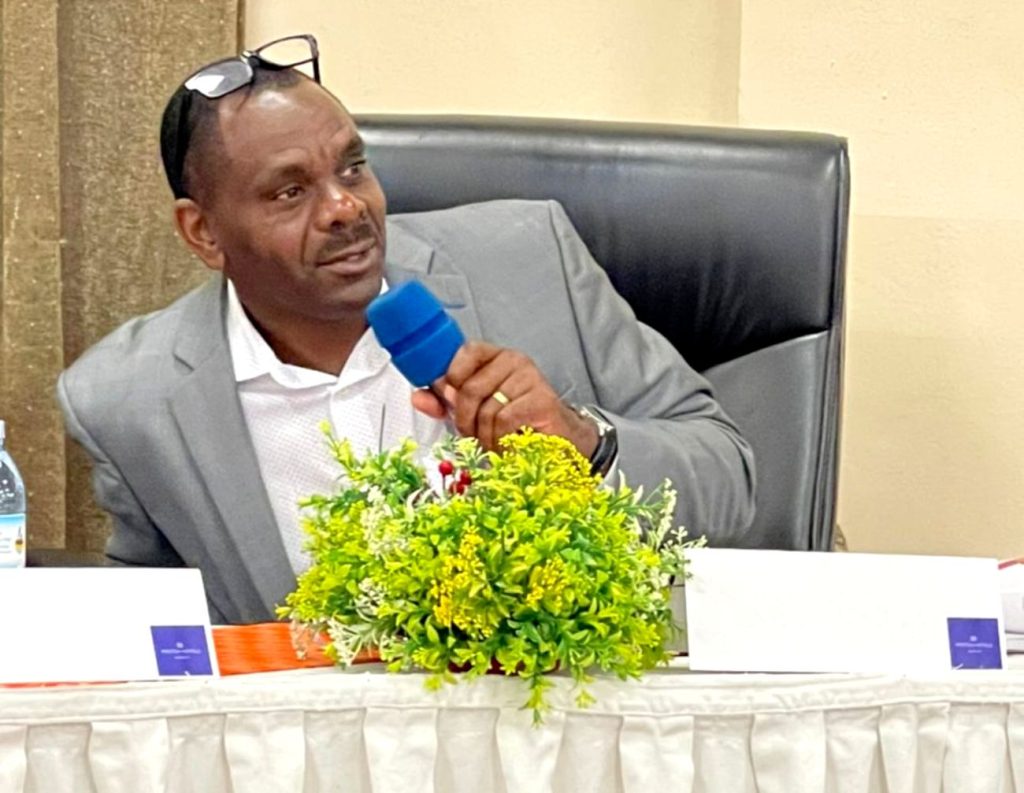
The Principal, College of Agricultural and Environmental Sciences (CAES), Prof. Gorettie Nabanoga reiterated the need to build resilient communities and ecosystems for improved livelihoods. “Through research, we are looking for ways of improving community resilience in order to have sustainable ecosystems for improved livelihoods. This conference serves as a platform for us to share experiences in the different ecosystem research areas and best practices in trying to curb climate change. Climate change is real and a lot has to be done. We need to re-adjust the way we do things. There are practices we have come up with in relation to our day to day activities like water conservation and soil management that will help us combat some of the hazards resulting from climate change, and at this conference, we are focusing on climate smart agriculture. As a country, we purpose to move from substance climate smart agriculture to an income-oriented climate smart agriculture,” she said.The Principal also noted that the College was committing more efforts towards achieving the sustainable development goals. “As a country, we committed to having an input to achieving the SDGs.At this conference, we are emphasizing our intention and being very proactive in ensuring that we tackle the SDGs, putting it in mind that we have only 8 years to hit our target.As researchers, we are purposing to make contribution to the realization of all SDGs, with special focus on Goal 1 that seeks to alleviate poverty.”
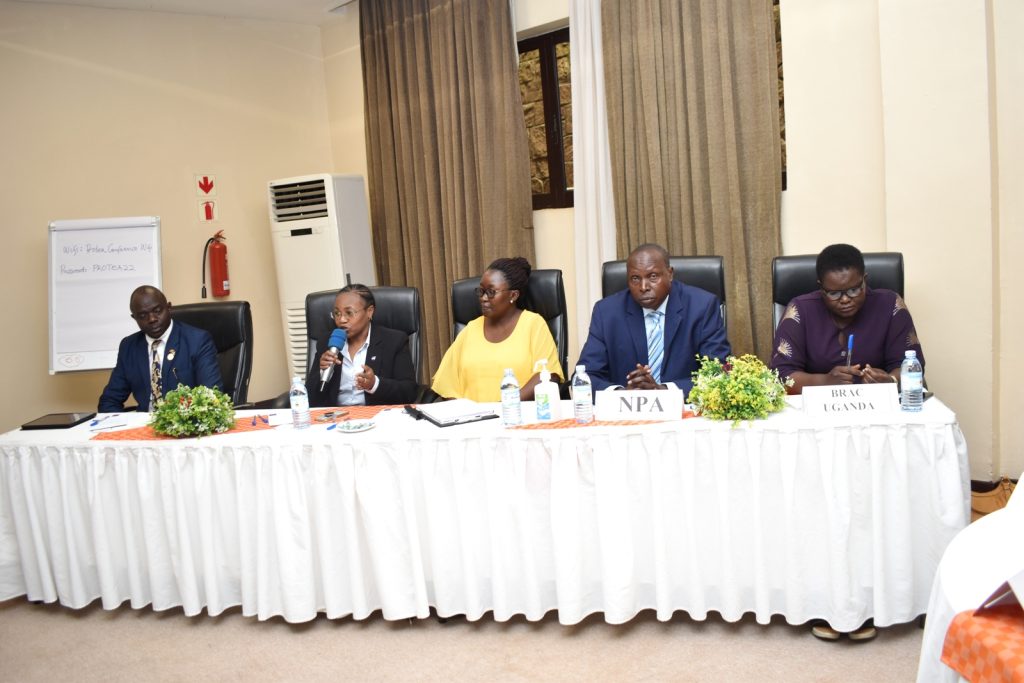
Addressing participants, the Chair of the Organizing Committee, Prof. Yazidhi Bamutaze said the conference presented a great opportunity for conceptual, empirical and theoretical discourse on pressing sustainability and resilience issues. “The GORILLA conference serves as a platform for bridging the science-policy-practice gaps and deriving actionable and policy-oriented measures that can potentially transform societies,” he noted. He said a special publication had been planned with the African Geographical Review (AGR) journal in commemoration of Mak@100. He expressed gratitude to the sponsors of the conference and the local organizing committee.
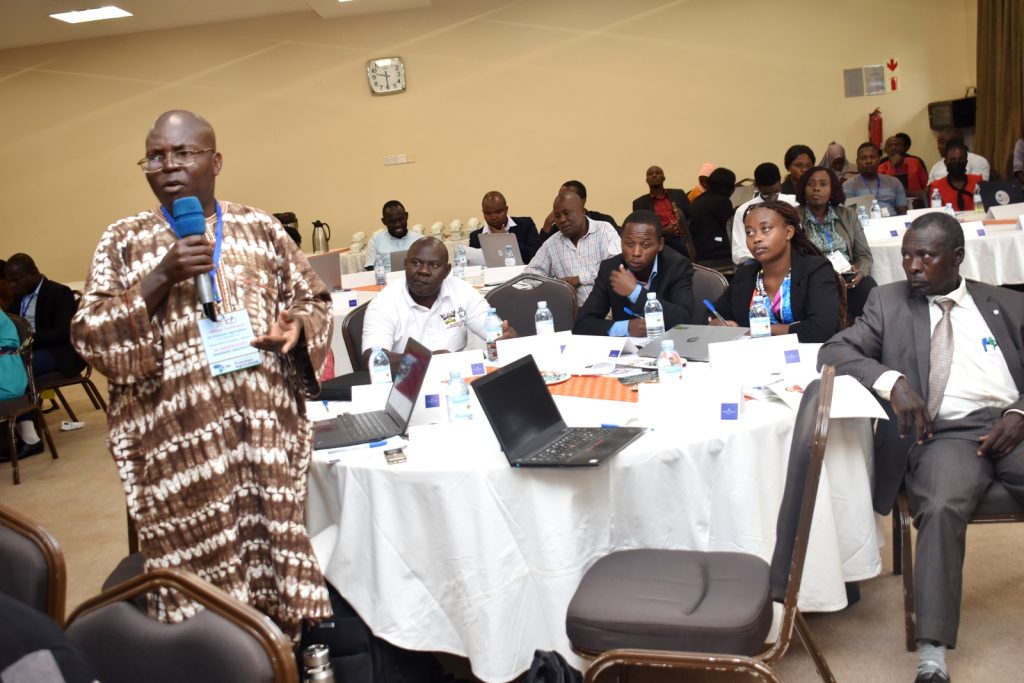
Delivering his remarks, the Head, Department of Geography, Geoinformatics and Climatic Sciences, Makerere University, Prof. Mugagga Frank appreciated the sponsors of the conference and the participants for committing time and resources to address issues crucial for sustainable management of ecosystems and livelihoods. He also appreciated the International Geographical Union (IGU) for its support towards the Uganda Geographical Association. “We profoundly thank IGU, through Prof. Michael Meadows for supporting us when we petitioned against the merger of the Bachelor of Geographical Sciences with Meteorology and Environmental Sciences at Makerere University. The petition was successful and the programmes were left as distinct disciplines,” he noted. Prof. Mugagga is the President of the Uganda Geographical Association, an organization that works to develop professional geographers with knowledge and skills to effectively address global environmental challenges. The Association conducts research on pertinent issues affecting humanity such as climate change adaptation and mitigation, landslides, floods, soil erosion and sedimentation, land degradation, regional development, ecosystems management, urbanization, population growth and development, water scarcity and food security. The Association also holds periodic retooling courses for geography teachers and other civil servants. Prof. Mugagga congratulated Prof. Yazidhi Bamutaze upon being elected IGU Vice President for Africa.
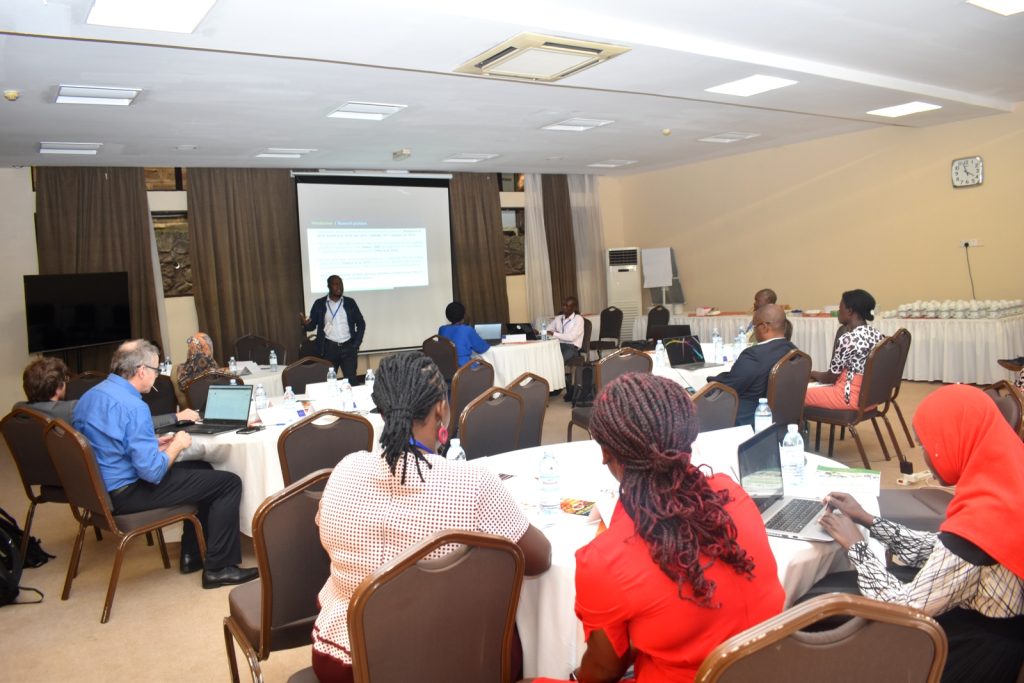
In his closing remarks, Dr Jerome S. Lugumira, Natural Resources Manager (Soil and Land Use), NEMA said government was committed to the use of science in fostering national development. He reiterated the power of networking in trying to address global development challenges and urged researchers to actively engage policy makers in their projects.
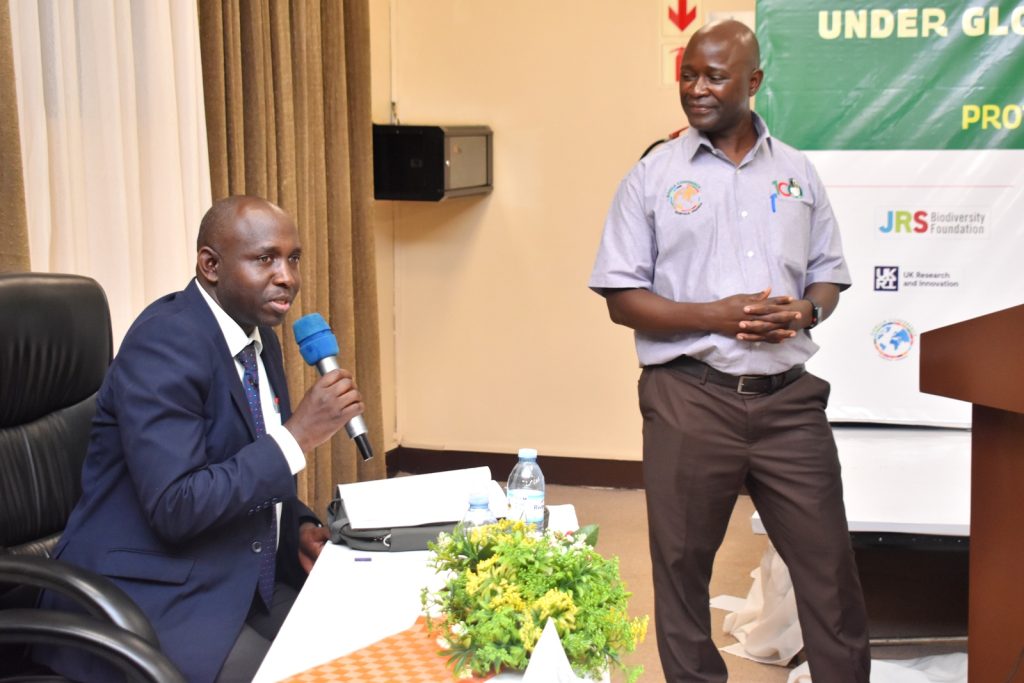
Pre-conference hackathon and training
Satellite Earth Observation (EO) provides a wide range of environmental data information which is key to the effective planning and monitoring of the environment. In this regard, the College held a three-day pre-conference hackathon on geospatial-based cloud computing for biodiversity and ecosystem resilience with the aim of engaging early career scientists, researchers and practitioners with diverse backgrounds to foster collaboration in the use of geospatial technology and earth observation to address sustainable development issues, especially on biodiversity and ecosystem resilience.
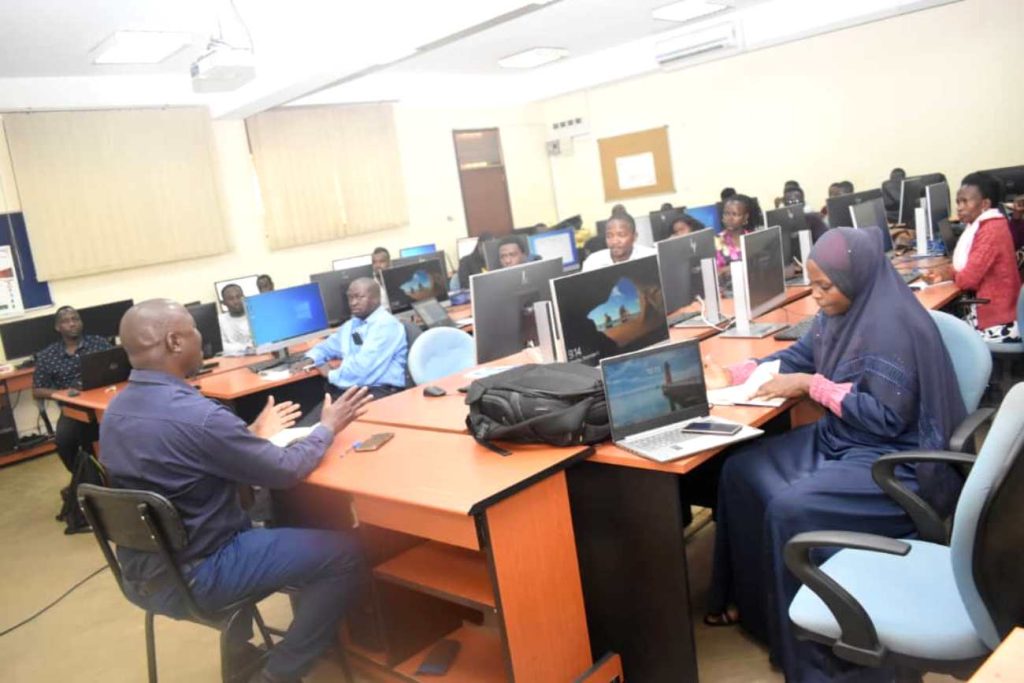
The College also held a three-day training on optimizing emerging geospatial technologies in evaluating climate change impacts on vegetation. Vegetation resources in tropical Africa are under increasing threat both from climate change and a spate of anthropogenic activities. Yet a substantial proportion of livelihoods in Africa is linked to environment and natural resources. Thus, the need for improved monitoring to ensure integrity and resilience of vegetation resources and ecosystems is apparent in line with the goals and tenets of the Global Development Agenda 2030. Geospatial technologies occupy a vintage position in monitoring, analysis and overall resilience building. The training aimed to, 1) equip participants with emerging tools and technologies that can be harnessed in analyzing climate change impacts on vegetation and ecosystems, 2) build an ecosystem of champions to propel the utility of geospatial technology, 3) to improve the ecosystem and vegetation resilience to climate change.
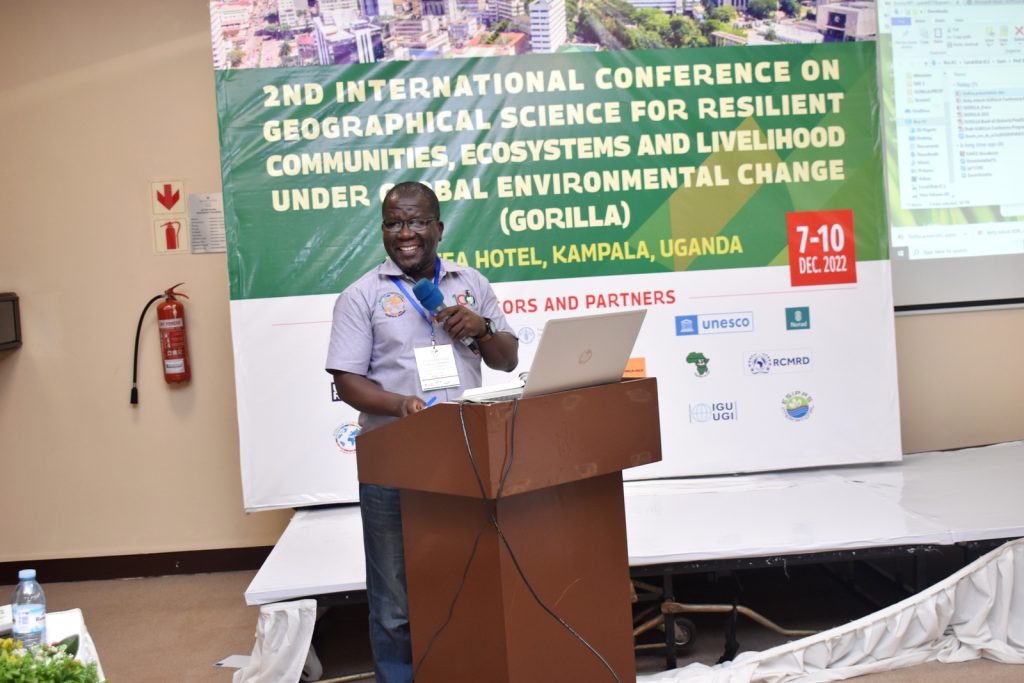
The trainings were coordinated by Dr Daniel Waiswa from the School of Forestry, Environmental and Geographical Sciences, Makerere University; and conducted by Dr Allan Mazimwe from the Department of Geomatics and Land Management, College of Engineering, Design, Art and Technology (CEDAT), Makerere University; Dr Bernard Barasa from the Department of Geography, Kyambogo University; and Mr. Thomas Enuru from the School of Food Technology, Nutrition and Bio-Engineering, CAES.
Details on the 1st GORILLA Conference at: https://news.mak.ac.ug/2020/12/the-1st-international-gorilla-conference-opens-at-mak/
Please see below for conference documents.
GORILLA Keynote Presentation_Dr. Samuel Tetteh Partey, UNESCO: https://doc-0s-58-docs.googleusercontent.com/docs/securesc/b07ld2tllpi647jp9b09m7chohgqnct1/tv2v4ikl813e11s5vhhkmrlatg2j282v/1670919975000/13459373403972771569/11467171637526004956/14Vc2iWRxryo_MNXMxq0I_dLBYocO7O34?e=download&authuser=0
You may like
-


Mak News Magazine: February 2026
-


Celebrating Academic Excellence: CoBAMS Presents 975 Graduands at Mak 76th Graduation Ceremony
-


Mak 76th Graduation Ceremony: CoNAS Presents 16 PhDs & Best Performing Male Student in the Sciences
-


Medical graduates urged to uphold Ethical values
-


CAES Presents Overall Best Performing Student in the Sciences & a Record 28 PhDs at the 76th Graduation Ceremony
-


Graduation marks the next phase of accountability, graduates told
Agriculture & Environment
CAES Presents Overall Best Performing Student in the Sciences & a Record 28 PhDs at the 76th Graduation Ceremony
Published
5 days agoon
February 25, 2026
The College of Agricultural and Environmental Sciences (CAES) presented the best performing student in the Sciences at the 76th Graduation Ceremony of Makerere University. Ms. Esther Ziribaggwa graduated with a CGPA of 4.77 in the Bachelor of Agricultural and Rural Innovation. She credits her success to resilience and hard work, despite the financial challenges she faced during her studies.
The four-day 76th graduation ceremony commenced on 24th February 2026 with the CAES, the College of Computing and Information Sciences (CoCIS), the College of Education and External Studies (CEES), and the School of Law presenting graduands for the award of degrees and diplomas of Makerere University.

CAES Graduation Statistics
CAES presented a total of 561 students (238 female and 323 male). Of these 28 (10 female and 18 male) graduated with PhD, 144 (68 female and 76 male) with Masters, 380 (157 female and 223 male) with Bachelor’s degrees, and 9 with Post graduate diplomas (3 female and 6 male). The PhD graduates included; Mr. Ainebyona Ronald Rwambuka, Ms. Amongi Winnyfred, Ms. Apil Jenifer, Mr. Asizua Denis, Mr. Astatke Dejene Kebede, Ms. Atuhairwe Privah, Ms. Ayesiga Stella Bigirwa, Mr. Biryomumaisho Dickson, Ms. Cherotich Harriet, Mr. Kalimunjaye Samuel, Ms. Kesiime Vasiter Eunice, Ms. Khakasa Elizabeth, Mr. Kimbowa George, Mr. Komi Gentle Wilson, Mr. Kusiima Kaheesi Samuel, Mr. Mathe Lukanda Musondolya, Mr. Mukama Innocent Hope Tinka, Mr. Mukengere Bagula Espoir, Mr. Nakhokho Evans Martin, Ms. Faridah Nalwanga Sendagire, Ms. Nalweyiso Amina, Ms. Nampijja Zainah, Ms. Njenga Peninah Wambui, Mr. Nkurunziza Gelase, Ms. Ojera Alal Ato Gertrude Miriam, Mr. Sebuliba Richard Mutumba, Mr. Shimali Fred, and Mr. Ssubi Allan Johnson.

Overall graduation Statistics
During the course of the 76th graduation ceremony, a total of 9,295 students will graduate with degrees and diplomas of Makerere University. Of these, 4,262 (46%) are female and 5,033 (54%) are male. A total of 213 students will graduate with PhDs, the highest number in the history of the University; 2,503 with Masters degrees; 6,343 with Bachelor’s degrees; 206 with postgraduate diplomas, and 30 with Diplomas.
Postgraduates constituted 31.4% of the total number of graduands.
Remarks by the Vice Chancellor
Addressing the congregation, the Vice Chancellor of Makerere University, Prof. Barnabas Nawangwe, congratulated the graduates on reaching this significant milestone. “You graduate today from one of the finest universities in the world,” he said. “You have distinguished yourselves through discipline, integrity, and academic excellence, and we are immensely proud of you. The qualifications you carry are vital to society. We have equipped you with the knowledge and skills to secure employment or to create enterprises that will, in turn, employ others. Should you not find immediate employment, do not despair, instead, reflect on the vast opportunities around you and rise to the challenge as entrepreneurs. Do not despise humble beginnings. To our PhD graduands, you now join the global community of scholars. Africa looks to you with great expectation. Use your expertise to transform our continent.”

He appreciated the parents and guardians for the sacrifices they made to support their children’s education.
New Research Excellence Recognition Plans
The Vice Chancellor informed the congregation that beginning with the 76th graduation ceremony, the University will recognize outstanding PhD students who are members of staff. He congratulated those who completed their doctoral studies in record time while continuing to serve without study leave, commending their resilience and leadership. “These will receive the Makerere PhD Resilience Award”.
Similarly, the University will henceforth honour the best PhD and Master’s theses, as selected by the Higher Degrees Committee of Senate. The students with the top 10 theses at the 76th graduation are: Kawesi Paul – MA Law (School of Law), Katende Stephen – MSc Quantitative Economics (COBAMS), Najjinda Shamirah – PhD Management (COBAMS), Turyahabwe Irene – MSc Molecular Biology (COVAB), Tayebwa Dickson – PhD (COVAB), Batte Herbert – PhD Mathematics (CONAS), Ssekago Arnold – MSc Mathematics (CONAS), Namiyingo Julian – PhD Literature (CHUSS), Namata Brenda – MSCO (CHUSS), and Tayebwa Asaph Kamau – MBA (MUBS).

Recognition of the CAES Research Output
In his remarks, the Vice Chancellor commended the College of Agricultural and Environmental Sciences for spearheading transformative research aimed at strengthening Africa’s food systems. Among the initiatives he highlighted was the Healthy Soy Project, funded by the Danish Ministry of Foreign Affairs, which seeks to develop sustainable, affordable, and nutritious soy-based foods to combat child stunting in Uganda and other climate-affected regions. He also cited a project focused on enhancing value addition in cocoa production through the development and scaling of a single fermentation box technology, now adopted by more than 70% of farmers in major cocoa-producing districts.

Efforts to Transform Makerere into a Research-led University
The Vice Chancellor noted that Makerere University continues to advance steadily toward becoming a truly research-led institution – one that generates knowledge to empower communities, strengthen industries, and drive national transformation.
He expressed gratitude to the Government of Uganda for entrusting the University with resources to support more than 1,400 high-impact research and innovation projects under the Makerere University Research and Innovations Fund (Mak-RIF). The Fund has enabled researchers to provide practical, evidence-based solutions in sectors including agriculture, land management, energy and minerals, peace and security, and education. Through Mak-RIF, over 200 PhD students have received support to pursue their research, many of whom are graduating at the 76th graduation ceremony.

The Vice Chancellor further highlighted the pivotal role of the Makerere University Technology and Innovations Centre (MUTIC) in advancing incubation and commercialization. “The Centre offers mentorship, business development training, intellectual property support, and industry linkages to help transform research outputs into viable enterprises. To date, eleven spin-off companies have been established by students and staff, while the University’s Innovation Pod (UniPod) has incubated more than 100 projects in the past year. The short-term target is to establish 50 spin-off companies annually, with plans to double that number in the long term.”
In partnership with the Science, Technology and Innovation Secretariat in the Office of the President, the University has also introduced awards to recognize outstanding researchers and innovators. “The Innovation Commercialization Award underscores the institution’s commitment to translating research into practical products, services, and technologies that address real-world challenges and support national development,” the Vice Chancellor noted.

Prof. Nawangwe appreciated the Government of Uganda for securing a USD 162 million loan from the Korea Exim Bank to support critical infrastructure development at the University. The funding will facilitate the construction of new facilities for the School of Medicine, School of Dentistry, School of Engineering, the Science and Technology Centre, and the completion of the School of Computing and Information Sciences- an unprecedented development in the University’s history.
He also thanked development partners who provide research grants and scholarships, including the MasterCard Foundation, European Union, Norwegian Agency for Development Cooperation, Swedish International Development Cooperation Agency, International Development Research Centre, Korea International Cooperation Agency, German Academic Exchange Service, National Institutes of Health, Centers for Disease Control and Prevention, United States Agency for International Development, Wellcome Trust, KfW, Inter-University Council for East Africa, Regional Universities Forum for Capacity Building in Agriculture, African Research Universities Alliance, the PLUS Alliance, the Worldwide Universities Network, the Association of African Universities, the Alliance for African Partnership, the Madhvani Foundation, and the Government of Uganda through the Higher Education Students Financing Board.

He further acknowledged the Embassy of China, the Chinese Chamber of Commerce, various government ministries, State House, and private sector partners – including Stanbic, Absa, NCBA, DFCU, and Centenary Bank-for their continued support.
Remarks by the Chancellor
In his remarks, the Chancellor, Hon. Dr. Crispus Kiyonga, appreciated the parents, guardians, and sponsors whose unwavering support enabled the students to succeed.
“At the heart of the graduands’ accomplishments are the professors, lecturers, and administrators of the University, ably supported by the University Council. It is only fitting that we acknowledge and commend them for a job well done,” he noted.

He further extended profound gratitude to H.E. Yoweri Kaguta Museveni and the NRM Government for the invaluable financial and other support extended to the University.
Going forward, he encouraged the University Administration to strengthen research funding, forge stronger partnerships with the private sector to commercialize innovations, deepen structured engagement with communities, and fully leverage the abundant technological resources available to the institution.
Message from the Minister of Education and Sports
The Minister of Education and Sports, also First Lady, Hon. Janet Kataaha Museveni, represented by Hon. Dr. Joyce Moriku Kaducu – Minister of State for Primary Education, commended the Vice Chancellor and the leadership of Makerere University for upholding the standards that continue to distinguish the University across Africa and beyond.

She expressed gratitude for the spirit of constructive collaboration among management, staff, students, and development partners, noting that such cooperation is vital for institutional growth and academic excellence. She paid special tribute to the University Council, particularly the Chairperson and its members, for their dedicated oversight and stewardship. Their commitment to transparency and good governance, she observed, has strengthened public confidence in this historic institution.
A major milestone highlighted by the Minister was the establishment of the Makerere University Research and Innovation Fund (RIF), which supports high-impact research aligned with national priorities and development goals. Through this initiative, thousands of researchers and innovators have developed practical, scalable solutions that are transforming communities and key sectors across Uganda.

She reaffirmed the Ministry’s commitment to strengthening higher education through expanded research funding, digital transformation, cultural reform, and stronger collaboration between academia and industry. “The vision is clear: universities must not only produce graduates, but also solution-makers and job creators”.
Implementing the Competence-based Education and Training
Reiterating a key directive from the Ministry of Education and Sports, she emphasized that all institutions of higher learning must prepare for the full implementation of Competence-Based Education and Training by July 2027. “This reform represents more than a policy shift. It signals a fundamental transformation in how graduates are prepared, with greater emphasis on practical skills, innovation, and problem-solving.”

She urged the Vice Chancellor and his team to lead in curriculum reform, staff development, and infrastructure enhancement to ensure the successful rollout of competence-based education.
The Minister further urged university management to ensure that all satellite campuses are fully accredited and that their programmes meet the same high standards of quality and relevance as those offered at the main campus. This, she stressed, is essential to safeguarding the integrity of the University’s degrees and effectively serving students nationwide.

Addressing the graduates, she noted that Uganda and Africa need innovators to modernize agriculture, engineers to build quality infrastructure, healthcare professionals to strengthen health systems, and educators to inspire future generations. “The world you are entering is dynamic, interconnected, and technologically driven. Artificial Intelligence is reshaping industries; climate change is redefining agriculture and urban planning; and global markets are transforming employment patterns. In this rapidly evolving landscape, you must remain adaptable, creative, and committed to lifelong learning.”
Address by the Commencement Speaker, Prof. Nicholas Ozor
In his address titled Knowledge with Purpose and Service with Integrity, the Commencement Speaker, Prof. Nicholas Ozor, Executive Director of the African Technology Policy Studies Network, urged the graduates to embrace lifelong learning, prioritize purpose over comfort, build character before career, and serve something greater than themselves. He encouraged them to believe in Africa and take action, rather than waiting for solutions from elsewhere.

Addressing the graduates of CAES, he emphasized that they stand at the intersection of survival and sustainability. “In a world confronting climate change, food insecurity, and environmental degradation, your knowledge is vital. You will work with farmers, ecosystems, land, water, and policy. You will shape food systems and livelihoods. Respect indigenous knowledge, embrace scientific innovation, and champion sustainability. The future of Africa depends on how well we feed our people and protect our land.”

Research Excellence and Innovation Commercialization Awards
During the graduation ceremony, Makerere University recognized the top researchers and innovators from the 10 Colleges. At CAES, Dr Mugabi Robert from the School of Food Technology and Nutrition received the Overall Top Researchers Award, 2026; Dr. Nalwanga Sendagire Faridah received the Best Early Career Researcher Award, Dr Mugabi Robert scooped the Mid-Career Research Award whereas Prof. Yazidhi Bamutaze got the Senior Career Research Award. Prof. Phinehas Tukamuhabwa, Dr Ephrahim Nuwamanya, Assoc. Prof. Ahamada Zziwa, and Dr Ssempijja John Edson were recognized among the best innovators.

More about Esther Ziribaggwa, the overall best performing student in the sciences:
Agriculture & Environment
Mak hosts First African Symposium on Natural Capital Accounting and Climate-Sensitive Macroeconomic Modelling
Published
1 week agoon
February 20, 2026
African economies are increasingly exposed to climate-related shocks that threaten development gains, fiscal sustainability, and macroeconomic stability. From extreme weather events and biodiversity loss to the depletion of natural capital, climate risks are reshaping economic realities across the continent. Yet many macroeconomic frameworks used in public finance and planning continue to overlook climate and nature-related risks and the long-term benefits of resilience and adaptation investments.
To address this emerging reality, over 250 participants from Africa, Europe and beyond, convened at Makerere University – Kampala, on the 12th and 13th of February 2026, to participate in the First African Symposium on Natural Capital Accounting and Climate-Sensitive Macroeconomic Modelling.
Following the theme, “Climate-Sensitive Macroeconomics: Rethinking Growth in Africa’s Natural Resource Base, the hybrid symposium organized by Makerere University through the Centre of Excellence for Africa Climate-Sensitive Macroeconomic Modelling (CEACM) within the School of Economics, under the College of Business and Management Sciences (CoBAMS), the Environment for Development Initiative (EfD), and the Ministry of Finance, Planning and Economic Development (MoFPED) in Uganda, brought onboard ministers, leading economists and planners, researchers, policy makers, the academia, development partners, climate change experts and the media.
The Symposium being the first of its kind on the continent, reflected Africa’s growing determination to work collectively in confronting shared development challenges, building on recent momentum such as the formation of Pan-African Finance Ministers Forum for Climate Action (PAFMCA).
Featuring speeches and presentations from notable speakers and partners, a keynote address on Natura Capital Accounting and Climate Change Nexus in Africa and their impact on Fiscal Policy, panel discussions, expert opinions, and exhibition kiosks (World Café), the symposium presented a platform to strengthen Africa’s analytical and institutional capacity to integrate climate and natural capital considerations into macroeconomic and fiscal policy.
Vice Chancellor underscores the role of universities
Welcoming the delegates to Makerere University, the Vice Chancellor-Prof. Barnabas Nawangwe emphasized that universities must lead innovation and collaborative research efforts to support collective climate change mitigation across the continent.
In the same vein, he advocated for strong collaboration between universities in Africa and government Ministries. “Makerere’s collaboration with the Ministry of Finance, Planning and Economic Development, stands as a shining example of how academia and government can strengthen economic management,” he said.

Prof. Nawangwe revealed that the collaboration between Makerere University and the Ministry, has strengthened macroeconomic modelling, fiscal policy analysis, and technical capacity within government. In addition, the partnership led to the establishment of the Centre of Excellence for Africa Climate-Sensitive Macroeconomic Modelling, bridging academic scholarship with real-world policy application.
“We have jointly established the Centre of Excellence for Africa Climate-Sensitive Macroeconomic Modelling. The Centre (established in August 2025) is anchored within the School of Economics in the Department of Policy and Development Economics, under the Master of Science in Economic Policy and Investment Modelling, a program jointly facilitated by Makerere University, the Ministry of Finance, Planning and Economic Development and the Bank of Uganda,” he mentioned.
Climate and Economic transformation are inseparable
The Vice Chancellor highlighted the critical intersection between economic transformation and environmental sustainability, noting that economies in Africa, heavily dependent on natural resources, face unprecedented pressures from climate shocks, biodiversity loss, and environmental degradation. Convinced that economic growth cannot be pursued in isolation from climate and environmental realities, he stressed the importance of integrating natural capital accounting and climate considerations into national development strategies.
Prof. Nawangwe advocated for shared responsibility of universities, research institutions, and policymakers to develop innovative analytical tools, responsive policy frameworks, and strong institutional capacities that promote sustainable growth while safeguarding environmental assets for future generations.
The Vice Chancellor commended UN PAGE and the Global Green Growth Institute (GGGI) for funding the symposium, as well as, other stakeholders namely the European Union and the Coalition of Finance Ministers for Climate Action (CoFMCA), Ministry of Water and Environment (MoWE), National Planning Authority (NPA), Uganda Bureau of Statistics (UBOS), the National Environment Management Authority (NEMA) for being reliable partners.
Integrating Climate into Fiscal Policy
During the opening ceremony, the Minister of Finance, Planning and Economic Development, Hon. Matia Kasaija underscored the urgency of embedding climate considerations into economic planning.
“As Ministers of Finance, we are often confronted with difficult trade-offs. Our task is to balance the needs of today with sustainability for future generations,” said Hon. Kasaija, in a speech read by Hon. Henry Musasizi, the Minister of State for Finance (General Duties).

The Minister guided that traditional macroeconomic models focusing only on growth, inflation, and fiscal balance are inadequate in an era of climate shocks. He affirmed that African economies are facing interconnected challenges which directly impact economic growth. He stressed that traditional macroeconomic frameworks must evolve to systematically incorporate environmental degradation and climate shocks, whose consequences can no longer be ignored in policy analysis.
“For countries such as Uganda, whose development prospects are closely linked to natural resources and the climate-sensitive sectors, these challenges are not abstract. They affect livelihoods, public finances and long-term economic resilience,” he mentioned.
The Minister emphasized that natural capital accounting and climate-sensitive macroeconomic modelling are vital for valuing natural assets, assessing environmental costs, and guiding sound investment decisions.
Protecting Africa’s Natural Capital
Hon. Beatrice Atim Anywar, Minister of State for Environment, emphasized the urgent need to protect Africa’s ecosystems. “Africa stands at a defining crossroads. Our economies remain anchored in natural capital—forests, water resources, biodiversity, land, and ecosystems—which sustain life, generate fiscal revenue, and underpin development,” she said.
She warned that climate-related shocks are already undermining growth and public investment. “Floods, droughts, land degradation, biodiversity loss, and water stress are no longer distant risks. They are present realities, already affecting productivity and macroeconomic stability,” she said.
She emphasized the need for improved economic models that account for environmental and climate risks: “Traditional macroeconomic frameworks have not adequately captured climate risks or the long-term economic benefits of resilience and adaptation. This limits our ability to make informed policy decisions as Africa pursues economic transformation, energy security, and fiscal stability,” she stated.
Hon. Anywar highlighted collaboration with GIZ, Makerere University, and government ministries, which led to the development of the MONCAP (Model for Natural Capital Policy Assessment). “This tool is being used to assess natural capital assets for climate change, energy transition, and their linkages to the macroeconomy. It supports budgeting by estimating the cost of depleted natural capital assets,” she said.
“Water security, forest conservation, ecosystem restoration, and climate adaptation are not costs. They are investments in Uganda’s long-term economic stability, productivity, and prosperity.”
Stakeholders urged to transform climate threats into opportunities
Adam Sparre Spliid, the Deputy Head of Mission, Danish Embassy said: “Integrating climate risk and natural capital into our macroeconomics frameworks is not only academic exercise, it is a massive de-risking strategy for private investment. By bridging the gap between government policy and planning, academia and research, and the private markets, we transform climate threats into tangible opportunities.”
Sustainability includes youth, jobs and human well-being
Dr. Steven Stone, Chair of the UN PAGE Management Board, emphasized that sustainability extends beyond the environment to encompass youth, jobs, economic growth, and human well-being. “While the environment is Africa’s foundational source of wealth, sustainable development requires balancing ecological stewardship with economic progress, including income and employment for the youth which are critical priorities for countries such as Uganda.”
Dr. Stone highlighted that UN PAGE, originating from the Rio+20 Conference, supports climate-sensitive economic policy in Africa, emphasizing that dialogue, scenario-building, cross-sector collaboration, and strong partnerships are key to advancing sustainable, inclusive, and climate-resilient development.
Africa’s Wealth Declining
In the keynote address titled, Natural Capital Accounting and Climate Change Nexus in Africa and their Impact on Fiscal Policy, Paul Jonathan Martin, Manager of Environmental Operations at the World Bank for Eastern and Southern Africa, and a specialist with over 30 years in climate and natural resources, warned that Africa’s overall wealth is under threat due to declining renewable natural capital.
“Produced capital has increased by 20%, human capital by a third, but renewable capital has declined by 30%,” Martin said. “When combined, Africa’s overall wealth trajectory has been weakening since 2010.”
He stressed that natural resources must be treated as economic assets requiring systematic accounting: “Africa’s rich natural resources are fundamental for sustainable development,” he said.
Citing examples from Ethiopia and Kenya, he highlighted successful integration of natural capital into public investment and budget decisions. “In Ethiopia, there are payments for ecosystems and investment prioritization tools. In Kenya, natural capital accounting integration into budgets has strengthened public investments. Climate change has deep, cascading effects across sectors, but Africa has major potential to lead climate solutions,” he said.

Martin also highlighted the economic benefits of climate adaptation: “From 2020–2050, the cumulative effect of adaptation on Uganda’s GDP is positive. Without action, under a dry/hot climate future, GDP could significantly deviate from projected growth paths.”
Drawing on insights from over 70 country climate and development reports produced by the World Bank, the keynote speaker highlighted the profound macroeconomic impacts of climate change across Africa. He stressed the importance of integrating climate and natural capital into macroeconomic planning. He noted that Africa’s forests, water systems, and biodiversity are vital for sustainable development but face growing threats from climate change, environmental degradation, and climate-related disasters that undermine productivity, public investment, and economic stability.
He observed that traditional macroeconomic models often fail to capture the value of natural assets and regulating ecosystem services, which are critical to both economic stability and resilience but are largely excluded from GDP calculations.
Africa-Led Solutions
Prof. Edward Bbaale, Principal, College of Business and Management Sciences (CoBAMS), stressed the importance of developing African-led solutions. “We need to champion the Africa-led model. We need approaches that fit our unique context. Africa is not here to take in other frameworks blindly,” he said.
By supporting research, training, policy dialogue and modelling innovation, the Centre of Excellence for Africa Climate Sensitive Macroeconomic Modelling (CEACM) positions Makerere University as a regional hub for advancing climate-sensitive macroeconomic policy across Africa.
He highlighted CEACM’s capacity-building programs: “Our goal is to ensure African Ministries of Finance have home-grown expertise to integrate climate and natural capital considerations into fiscal and macroeconomic policy. This is critical for long-term resilience and sustainable development,” he said.
The Principal explained that establishment of independent research centres enables Makerere University to go beyond traditional academic instruction and focus deeply on societal challenges, particularly those related to climate change, environmental degradation, and biodiversity loss.

He reported that the Centre of Excellence for Africa Climate-Sensitive Macroeconomic Modelling is structured to advance methodological innovation, develop new data systems, and strengthen climate-sensitive macroeconomic tools that are tailored to the African context.
MONCAP Model for Policy Assessment
Dr. Peter Babyenda, a member of faculty at CoBAMS, demonstrated MONCAP (Model for Natural Capital Policy Assessment), which integrates climate and natural capital variables into fiscal and macroeconomic planning.
“MONCAP allows policymakers to estimate the economic cost of depleting natural assets such as forests, wetlands, and water resources. It helps simulate policy options and determine how investments in natural capital yield long-term benefits,” Babyenda said. “We came up with this model to aid the Ministry of Water and Environment. This model is open—you can extend it,” he added.

He highlighted capacity-building initiatives, including short courses and the Master of Science in Macroeconomic and Investment Modelling, designed to train economists to incorporate natural capital and climate into policy planning.
International Perspectives
Sweetman Liam, Ireland’s Finance Minister, highlighted the economic value of ecosystems: “There is a deeper value of landscapes in flood prevention and biodiversity. Decision-making was informed, and people started understanding economic value,” he said.
Prof. Chukwuone Nnaemeka of the University of Nigeria emphasized collaboration with national statistical agencies: “We coordinate with the National Bureau of Statistics to develop natural capital accounting metrics. Increase the use of Natural Capital Accounting in decision-making,” he stated.
Technical and Parallel Sessions
The afternoon session featured three parallel sessions focusing on Natural Capital Accounting Methodologies and Best Practices, Climate-Sensitive Fiscal and Economic Modelling, and Natural Capital Accounting and Model Uptake and Use.
Drawing on diverse expertise, the panels highlighted innovative approaches and demonstrated that natural capital is not an environmental afterthought, but a central pillar of sustainable economic and policy planning.
The first day of the African Symposium drew to a close with interactive exhibitions at the World Café, where case studies and practical demonstrations highlighted innovative approaches to integrating climate and natural capital into economic planning. Participants actively engaged in discussions and networking, forging collaborations that promise to advance climate-sensitive fiscal and development strategies across Africa, setting a strong and optimistic tone for the days ahead.
Agriculture & Environment
Uganda Martyrs Namugongo Students Turn Organic Waste into Soap in an Innovative School Project on Sustainable Waste Management
Published
1 week agoon
February 20, 2026
*****The students were supervised by researchers from the College of Agricultural and Environmental Sciences (CAES) at Makerere University, led by Prof. Fred Kabi.
The garbage challenge
With urbanization rates rising rapidly across Uganda, municipal solid garbage generation in the country’s cities is projected to increase by more than 40 percent by 2050. The growing burden of unmanaged garbage, particularly organic garbage, continues to pose environmental and public health risks, underscoring the urgent need for innovative and sustainable solutions.
It is against this backdrop that Senior Four students of Uganda Martyrs Secondary School Namugongo undertook a project to demonstrate how local market garbage challenges can be transformed into opportunities for sustainable development.

Addressing the garbage Challenge
As part of their academic project under the competence-based curriculum, the students were tasked with identifying real-world challenges within their communities and developing practical solutions using locally available resources. Through research and field observations, they identified poor garbage management, particularly the accumulation of organic waste at major dumping sites such as Kiteezi Landfill, as a critical issue.
At these sites, unsorted solid garbage often accumulates uncontrollably, sometimes leading to collapses that pose serious environmental and public health risks including water contamination by leachates, persistent foul odors, and disease outbreaks.

Rather than solely viewing solid market garbage as a problem, the students recognized its untapped potential within the biodegradable fraction of market garbage streams. Their innovative solution was to convert organic solid market waste (biodegradable garbage) into an industrial raw material for soap production by utilizing saprophagous Black Soldier Fly larvae (BSFL) to accumulate lipids and applying the scientific process of saponification.
Makerere University Support to the project
The students’ project was supervised by Prof. Fred Kabi together with technicians from the College of Agricultural and Environmental Sciences (CAES) at Makerere University. Prof. Kabi and his team have been actively researching on Black Soldier Fly Larvae (BSFL) as a bio-waste management technology capable of converting biodegradable solid municipal garbage and farm waste into valuable by-products such as organic fertilizers, animal feeds, soap, and biodiesel.
Working in collaboration with Ento Organic Farm Uganda Ltd, the researchers have demonstrated how insect-based waste conversion systems can support a circular economy by transforming biodegradable waste into industrial raw materials.

According to Prof. Kabi, the five young garbage entrepreneurs (students) began their project by collecting information on household garbage management practices. After analyzing the data, they engaged stakeholders along the garbage value chain to brainstorm all-inclusive, source-based waste management strategies.
“The students developed a solution that links efficient waste management at garbage generation source to support production of organic fertilizer, insect protein for animal feeds, and soap, which is only possible with biodegradable garbage,” Prof. Kabi explained. “This approach of the Competence Based Curriculum (CBC) for lower secondary schools supports the concept of taking Makerere University to the community of budding scientists while promoting sustainable community development through a circular economy.”
From Market Waste to Soap Bars
The Team leader, Ms. Ivy Stephanie Kitali explained the step-by-step scientific process behind the project. The students began by collecting organic waste from local markets, which was then shredded to prepare it for the larvae as a substrate. “Black Soldier Fly larvae were then introduced to the prepared waste. The larvae efficiently consumed the organic matter, greatly reducing its volume while accumulating lipids (fats) in their bodies. After maturation, we separated the larvae from the remaining waste, euthanized through blanching and dried it. Oil was then extracted from the dried larvae using ethanol as a solvent. This lipid-rich oil became the primary ingredient or raw material for soap production. To enhance the final product, the larvae oil was blended with minute quantity of sunflower oil before adding sodium hydroxide, initiating saponification, the chemical reaction that transforms fats and oils into soap,” she explained. The process ultimately yielded usable bars of soap derived entirely from what had once been discarded as unwanted market waste/garbage.

Building Skills and Sustainable Innovation
Beyond producing soap, the project provided students with hands-on training in scientific research, waste management techniques, bio-chemistry, and sustainable innovation. They gained practical exposure to insect-based biotechnology and learned how environmental challenges can be addressed through science-driven by entrepreneurship.
Trending
-

 Humanities & Social Sciences7 days ago
Humanities & Social Sciences7 days agoMeet Najjuka Whitney, The Girl Who Missed Law and Found Her Voice
-

 General6 days ago
General6 days ago76th Graduation Highlights
-

 Health2 weeks ago
Health2 weeks agoUganda has until 2030 to end Open Defecation as Ntaro’s PhD Examines Kabale’s Progress
-

 Agriculture & Environment1 week ago
Agriculture & Environment1 week agoUganda Martyrs Namugongo Students Turn Organic Waste into Soap in an Innovative School Project on Sustainable Waste Management
-

 General2 weeks ago
General2 weeks agoMastercard Foundation Scholars embrace and honour their rich cultural diversity
